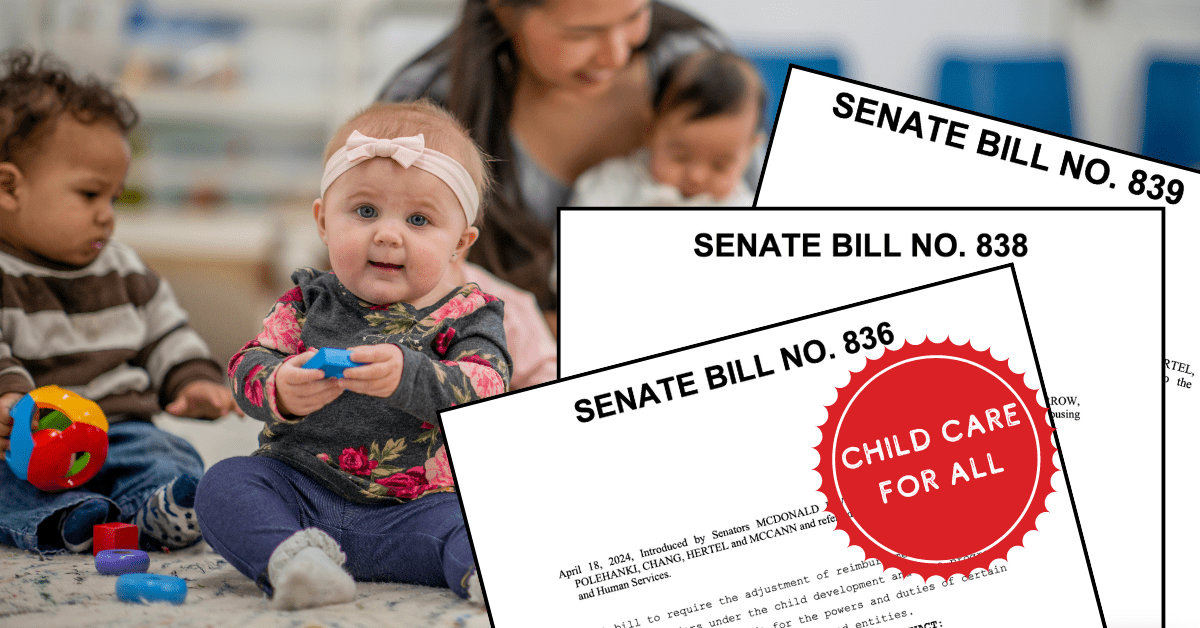
Lawmakers say Michigan is facing a ‘child care crisis.’ But a series of bills introduced this month would help to make child care (much) more affordable for thousands of families.
MICHIGAN—A package of eight bills introduced this week by Democratic lawmakers in the state House and Senate aims to offer a comprehensive plan that would make child care more affordable for Michigan families, as well as provide more support for childcare professionals.
Lawmakers are calling it the “Child Care for All” package. And if it passes into law, thousands of Michigan families would soon catch a significant tax break on the ever-rising cost of child care, and thousands of childcare facilities would receive more financial support from the state.
“Years of patchwork fixes on a broken system have cost Michigan families and cost our economy,” state Sen. Kristen McDonald Rivet (D-Bay City) said in a statement announcing the bills. “It’s past time to make the necessary public investment to set all our kids up for success, make child care affordable for parents and providers, and strengthen Michigan’s workforce.”
Here’s the deal:
The eight-bill package of legislation was introduced late last week by McDonald-Rivet and six other Democratic state lawmakers: Sens. Sarah Anthony (D-Lansing) and Kevin Hertel (D-St. Clair Shores); as well as state Reps. Alabas Farhat (D-Dearborn), John Fitzgerald (D-Wyoming), Denise Mentzer (D-Mount Clemens), and Jaime Churches (D-Wyandotte).
Together, the bills aim to help lower costs for Michigan families (and providers) as they continue to deal with a spate of shuttered childcare centers statewide, as well as growing waitlists—some as long as two years—at the facilities that have managed to stay open.
At the core of the problem is a “broken business model,” lawmakers said in a press release.
State data shows that Michigan has lost about 40% of its childcare capacity over the last decade, with private childcare facilities now serving about 80% of children from birth to age 5.
With average childcare costs topping $15,000 a year and most Michigan jobs paying annual salaries of less than $50,000, those costs represent a “considerable burden” on working parents—sometimes reaching as high as 40% of their take-home pay, state lawmakers said.
“As the father of two young boys, I know accessing quality, affordable child care is no easy feat,” Hertel said in a statement. “Far too many parents across our state have to choose between paying their grocery bills or paying their childcare bills—and some make the difficult decision to leave the workforce altogether to become a full-time caregiver. This crisis is harming families, harming children and harming our economy. If we want to build a Michigan where everyone can thrive, we must take actionable steps to improve care access, affordability, and quality.”
The new bills include:
Working Parents Tax Credit
Senate Bill 838 and House Bill 5640 would create a new state tax credit for childcare costs that’s based on the same eligibility requirements as the Earned Income Tax Credit. This year, that includes individuals earning less than $63,398, with an investment income below $11,000.
Lawmakers said the “pro-work” and “pro-family” credit would be refundable and paid monthly to parents of young children for an annual total of up to $5,500 per child—from infancy to age 3.
“Safe and affordable child care is not a luxury; it’s a necessity,” Mentzer said in a statement. “I have heard from countless constituents about the difficulties they face trying to juggle work, school, and childcare responsibilities. This package is an overdue commitment to investment in child care, ensuring Michigan remains a place to raise families for generations to come.”
New Licensing Requirements
Lawmakers said facility costs for childcare providers are typically higher than most businesses due to the necessary safety and education needs of very young children. And those costs usually leave a small margin left to pay their staff a living wage—often less than $15 an hour.
Senate Bills 837 and 839, as well as House Bills 5638 and 5639, would “update and modernize” state licensing requirements for Michigan’s childcare providers—namely to make it easier (and more affordable) for new childcare facilities to get opened and stay licensed in Michigan.
“As someone who worked in a daycare center, I have witnessed the economic, social, and emotional obstacles that working families encounter when trying to access child care,” Churches said in a statement. “I am eager to partner with our House and Senate colleagues and reinvest in Michigan’s workforce, economy, and families in order to tackle our childcare crisis.”
Childcare Provider Subsidies
Senate Bill 836 and House Bill 5637 would expand “contact-based” tax subsidies for childcare providers caring for children with special needs, as well as those working in low-income areas.
Specifically, it would require reimbursements to providers made through the state’s Child Development and Care program be adjusted annually to account for the rate of inflation.
“Families across Michigan are facing high childcare costs, made worse by long wait lists and a lack of available providers. The financial challenges are undeniable,” Fitzgerald said in a statement. “This plan would make child care both more affordable and accessible by investing in new childcare facilities and supporting parents who face this financial hurdle. Let’s unite as Michiganders in supporting our working families and ensuring our children thrive from the start.”
Budget Recommendations
State lawmakers also introduced a series of budget recommendations that would invest in childcare opportunities across Michigan—including through a series of operational grants and start-up financing for licensed providers who care for infants and toddlers. The overarching idea, lawmakers said, is to stabilize childcare businesses and free up resources to boost staff wages.
All told, the bills call for an immediate state investment of $1.5 billion—which lawmakers say “pales in comparison” to the cost of not taking action. One recent study shows that Michigan loses about $2.8 billion annually (in the form of workforce productivity and economic gains) due to the lack of reliable child care and workers subsequently choosing not to enter the workforce.
“These investments are not only necessary but non-negotiable for our state to become competitive, attractive to newcomers and supportive of our existing residents,” Farhat added.
What’s next?
The eight “Child Care for All” bills have been assigned to either the state Senate Committee on Housing and Human Services and the House Committee on Tax Policy. They’ll need to advance in both committees, as well as pass the House and Senate, before they can be signed into law.
“We have a long road ahead to ensure every working family has access to high quality, affordable child care,” Anthony said in a statement. “As Senate Appropriations Chair, I believe it is crucial we continue to chip away at this problem by investing in childcare professionals, streamlining licensing requirements for providers, and reducing financial barriers for families.”
READ MORE: New apprenticeships to recruit more Michiganders into child care
For the latest Michigan news, follow The ‘Gander on Twitter.
Follow Political Correspondent Kyle Kaminski here.
Politics

Trump says he would allow red states to track pregnancies, prosecute abortion ban violators
In an interview published by Time magazine this week, former president Donald Trump detailed his plans for a potential second term and said he would...

Whitmer: Reproductive rights still ‘in jeopardy’ in Michigan
Michigan Gov. Gretchen Whitmer is urging Michiganders to re-elect President Joe Biden in November—or else risk losing access to reproductive...

How to apply for a job in the American Climate Corps
The Biden administration announced its plans to expand its New Deal-style American Climate Corps (ACC) green jobs training program last week. ...
Local News

Detroit date night done right: 12 fresh and exciting ideas
Whether you want to make a good first impression with your latest Bumble match or surprise your spouse with an exciting evening out, Detroit is full...

Black cowboy culture will be on full display at upcoming Flint rodeo
Flint, Michigan, is set to host an exciting and culturally significant event this June: the Midwest Invitational Rodeo. This eagerly anticipated...






